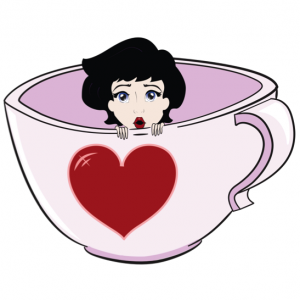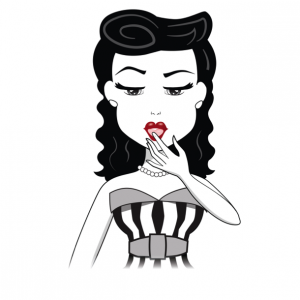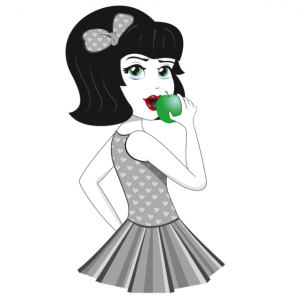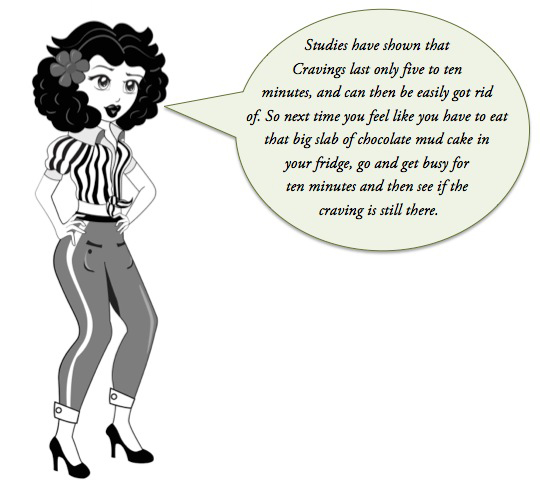Mood Food: Diet Do’s and Don’ts
Let food be your medicine and medicine be your food. – Hippocrates
This is an old page that is only here for archival purposes. If you would like to read more about how to overcome depression, you can buy a copy of my book The Upside of Down: A personal journey and toolkit for overcoming depression, by clicking here.
To put it simply: food is medicine. All of us know this intuitively. If you eat the right things in the morning, at lunch, or for dinner, you feel good. If you make the wrong choices you feel bloated, unfocused and tired. What if you have three doughnuts for breakfast? How do you feel thirty minutes later? I know I feel tired and lethargic. But what if you ate a healthy breakfast of oats and fruit? Your energy is likely to be much higher, and your mind much clearer.
Eating certain foods really can help keep bad moods at bay. Basically, the science of how food affects our moods is based on this equation: Dietary changes bring about changes in our brain structure, chemistry, and physiology, which lead to changes in behaviour!
Using food to regulate mood is becoming more common among people who suffer from depression. When feeling down, food activates the pleasure centres in the brain and gives some short-term relief. Unfortunately, eating does not deal with the underlying life issues or our thought patterns, which is why a holistic approach is required to treat mental illnesses and general unhappiness.
There are a couple of reasons certain foods affect our mood. The first is when people get wide fluctuations of sugar levels they can either feel really energised or really tired. The second is that carbohydrate foods help release serotonin into the brain. Whole grain breads and pastas are known to exhibit that reaction, which is why people often relate them to being good mood food.
Focus on feeding you body and brain the raw materials needed to create the right hormones and neural transmitters. Many sin foods are in fact good for you. Studies show chocolate (in its rawest form; raw cacao) promotes the release of endorphins and stimulant phenylethylamine, which mimics feelings of being in love.
Now when I say you need to focus on your diet, I mean loosely. If you cut out all so-called bad foods it will put a halt on your social life, and that is not going to make you feel better. Have a good dose of chocolate or ice cream once in a while, but make sure that 80 percent of the food that goes into your body is right for you.

Indulge occasionally. It is fun. And ultimately, you want to keep the fun side of food and cooking in your life. You don’t want to feel deprived from the things you love. Just remember anything in moderation is OK. Putting a dash of indulgence into the stew is the secret to success.
There are people who eat all the right food but feel utterly joyless from the gravity of their food-focused outlook. Make your changes gradual and listen to your body. When you eat a capsicum eat lots of it; when you want chocolate eat a small amount guiltlessly or replace the urge every second time with a piece of fruit.
We have heard the expression ‘you are what you eat’. So if you find yourself cranky, tired and even clinically depressed, you may be able to boost your mood by changing what you eat and when you eat. Our mental wellbeing all comes back to our diet. The severity of symptoms of depression often depends on the degree of nutritional deficiency. When the starving brain is fed what it needs, it can begin to function normally.
Studies show there are several things we can do, food-wise, to help stabilise our moods. I have listed some below. Try working them into your diet, because they offer many other health benefits, so you have nothing to lose.
BRAIN BUILDERS
Eat your greens
Leafy greens are nature’s antidepressants. They are an excellent source of folic acid, a lack of which has been linked to depressed mood. Depression caused by a folate deficiency is rare, but studies show that upping your intake can help to alleviate unhappy feelings.
Amazing asparagus
The root of asparagus has been found to be beneficial in the treatment of depression. It is highly nutritious and is used as an herbal medicine for mental disorders. It is a good tonic for the brain and nerves. One or two grams of the powder of the dry root of the plant can be taken once daily.
Go bananas
Bananas contain tryptophan, which the body uses to make the happiness hormone serotonin. They are also packed with potassium, levels of which can be depleted by stress. The vitamin B6 they contain will help regulate blood sugar and thereby stabilise mood.
Fruit is unique in that it barely requires any work to be digested, freeing our body to work in an effective manner. Because it is made up mostly of water, fruit hydrates the body and helps cleanse and detoxify.
Pomegranates for power
Drinking a glass of pomegranate juice helps balance the rise in glucose levels that follows a high-fat or high-calorie meal. In simple terms, that means you reduce the risk of an energy slump after eating. Feeling lethargic dampens your mood, so if you can ramp up your energy, your mood will improve.
Crunch down on cashews
The cashew nut is a handy snack to munch on and a valuable food for depression. It is rich in B vitamins, especially thiamine, and is therefore useful in stimulating the appetite and the nervous system. It is also full of riboflavin, which keeps the body active, cheerful and energetic.
Walnuts work wonders
Walnuts are second only to flaxseed in terms of vegetarian sources of omega 3 fatty acids. An increased intake of omega 3 has been shown to be very helpful in fighting depression and bipolar disorder. Like many nuts and seeds, walnuts help balance your mood and get rid of brain fog. Eat a handful each day to reduce your risk of depression or ease the symptoms.
Seeds of change
Pumpkin and sunflower seeds are also rich in omega-3 fatty acids, which have been shown to reduce the symptoms of depression and aid sleep. A seed contains all that is necessary to start growing a new plant, so it is little wonder they are tightly packed with essential nutrients.
Pumpkin seeds contain L-tryptophan, and for this reason have been suggested to help remedy depression. However, research is needed before pumpkin seeds can be considered for this purpose. It is unlikely the amount of L-tryptophan in pumpkin seeds would be sufficient to relieve depression.
Eat oily fish
Studies have found that societies that eat lots of fish have lower depression rates, possibly due to the way Omega-3 changes brain chemicals to boost mood. That is probably why the Japanese, who eat the most fish, are the least depressed. Oily fish, including mackerel and salmon, is one of the few foods that contain vitamin D, which we usually produce by being exposed to sunlight. It boosts serotonin levels, and is one reason most people feel happier on sunny days
Everyone can benefit from working more fish into their diet. It has been shown that people who have clinical depression have lower amounts of the long-chain polyunsaturated fats, which are found in Atlantic salmon and deep-sea cold fish.
Real rice
Brown rice is another winner. This complex carbohydrate contains B vitamins B1, B3 and folic acid, all of which help regulate mood. It has the advantage of being low on the GL (glycemic Llad) listing, and so helps prevent blood sugar swings and the mood swings that often accompany them.
Doctor Pepper
Hot chilli pepper can give a person a thrill that is more than purely sensory. The capsaicin, the hot substance contained in hot peppers, can induce in the brain a rush of endorphins that can temporarily elevate mood. When a person eats hot chillies, the capsaicin burns the nerve endings of the tongue and mouth, causing them to send false pain signals to the brain. In response, the brain tries to protect the body from perceived injury by secreting natural painkillers or endorphins. This gives a lift in the mood and person experiences a sense of wellbeing.
Gulp down garlic
Researchers at the University of Alabama studying garlic for its effects on blood and cholesterol noticed that those who ate the pungent vegetable experienced a definite lift in mood and had a greater feeling of wellbeing. They experienced notably less fatigue, anxiety, sensitivity, agitation and irritability. The power of garlic as a mood elevator can be attributed to its richness in selenium and its antioxidant activity.
Calming cardamom
Cardamom is one of the most popular spices and is thus called the ‘Queen of Spices’. It is known for lifting a person’s mood. Powdered seeds should be boiled in water and enjoyed as a herbal tea with a bit of honey.
BRAIN DRAINERS
The three big no-nos for people who struggle to keep a happy mental state are sugar, caffeine and alcohol. Too much alcohol can cause deficiencies in the vitamins needed for good mental health, and while sugar and caffeine give you a quick lift they can leave you feeling down when their temporary effects wear off.
Studies prove that eliminating the big three helps maintain a stable mood. People who had not responded to conventional therapies reported having more energy within weeks of eliminating sugar and caffeine from their diet. Eventually, almost 60 per cent also experienced improvements in mood.

Beware of sugar blues
Refined sugar has no nutritional value and has been linked to mental disorders and an imbalance of neurotransmitters in the brain, not to mention hypoglycaemia, dental cavities and enlargement of the lower kidneys. Even so, manufacturers love sugar’s versatility, putting it in nearly everything: juice, soft drink, beer, yoghurt, biscuits, lollies, bread, frozen goods – you get the picture.
Sugar is a known cause of altering mood. It gives your blood an instant rush of energy, but that does not last long. You will experience a drop in mood and energy an hour or so later, which can lead to poor concentration, anxiety, irritability, aggression, tiredness and, therefore, depression.
Sugar is a quick fix, but it will not sustain you for any length of time. The best sugars for the brain are complex carbohydrates such as fruit sugars. They do not cause the roller-coaster mood swings that the junk sugars do. Once in the body, complex carbs take longer to break down, giving you a consistent source of energy, rather than an instant surge followed by a sudden drop.
Fruits are better than fruit juices because the fibre in the fruit slows the absorption of the fruit sugar. A whole apple will be more brain-friendly than apple juice; a whole orange better than orange juice. Freshly made juice containing a lot of pulp is more brain-friendly than filtered juice.
Sugars leach out important minerals that are essential for the wellbeing of our nerves. One way of keeping depression and anxiety at bay is to remove all the foods that tend to cause sugar level disturbances, such as lollies, chocolates, cakes and biscuits. That way you will avoid the rapid highs and lows after excess sugar intake, and will not overload the liver’s detoxification pathways.
But do not be fooled into thinking you can replace sugar, with the many fake varieties. Aspartame, for example, which is found in diet soft drinks and other sugar-free food, can be even worse than real sugar. When paired with carbs, aspartame causes the brain to slow down its production of serotonin. So say goodbye to diet soda, and hello to happy chemicals.
Avoid alcohol
We all know alcohol is a depressant, so even though getting drunk may make you feel better for a few hours, all you are really doing is giving your depression free room and board. Alcohol numbs and suppresses emotion, which on the surface may seem like a godsend, but all it is doing is masking the pain, anger or anxiety you are feeling – it does not actually get rid of it.
Drinking stops you from having to deal with your emotions. If you experienced your emotions you would have to make changes to feel better. But downing a few glasses a night can take away that need – even if it is superficial. An addiction to alcohol signals more than a reliance on an unnecessary substance. It is the sign of a much deeper emotional problem.
Alcohol in excessive amounts should be avoided if you want to discourage low moods. Scientific evidence shows a direct link between serotonin dysfunction, negative moods, and excessive alcohol. Alcohol is the most socially acceptable of all drugs and intoxicants, but for women especially it can pose serious health problems. Alcohol is fattening, addictive, disorientating when drunk in excess, and potentially toxic to the vital functions of the liver, heart, kidneys and lungs.
It asks the liver to devote almost 80 per cent of its function to handling the chemical breakdown and eliminating its toxic excess. When the liver has large amounts of alcohol to deal with it becomes impaired in its other functions. Now, I am not telling you to stop drinking altogether. All you need to do is drink less.
Doctors recommend three alcohol-free days a week to help your system cleanse and replenish, and no more than two standard drinks a day to maintain good health. My advice would be to stay away from it as much as possible until you feel your depression is becoming less of a problem. Once you have learnt to control your moods, you can reintroduce moderate drinking.
Cut down on caffeine
How many times do we hear people say, ‘I need my morning cuppa before I can function properly’? It is now widely accepted that people need coffee to wake up. You should not need anything to wake up. It may seem like the end of the world to give up you daily caffeine fix, but you will learn to live without it.
Foods containing caffeine give the brain a buzz. This may be a welcome lift when the brain needs to be turned on, such as to study or to stay awake. Other times caffeine can be a detriment, such as when you want to turn off the brain and go to sleep, or when you need to stay relaxed under pressure.
Caffeine is also thought to increase anxiety in people, which can lead to panic attacks. It prevents deep, restful sleep necessary for optimal health and wellbeing, and over-stimulation of the nervous system has the potential to raise anxiety levels. Anxiety and depression go hand in hand, and make recovery harder.
Depression aside, caffeine can cause headaches, digestive problems, peptic ulcers, diarrhoea and constipation. It affects every organ system, from the nervous system to the skin. Caffeine raises stress and hormone levels, inhibits important enzyme systems that are responsible for cleaning the body, and sensitises nerve reception sites.
Even now, if I have something important on or am feeling a bit nervous about something I will avoid coffee. I find it can make me feel uptight and jittery. When your nerves are stretched tight, caffeine is the last thing you should have. The energy surge and increased alertness felt after having caffeine are due to the glycogen in your body being converted into glucose.
However, any positive effects you feel will be short-lived as your body’s store of glycogen soon runs dry. Herbal teas are caffeine free and come in a wide range of flavours. Do your body a favour each day and substitute a cup of coffee or tea with a cup of organic herbal tea.
But whatever you do, do not go reaching for the decaf. Coffee, whether regular or decaf, is highly acidic. Acidic foods make the body more prone to illness. So every single morning you are starting your day with a dose of poison. And if you are putting sugar in that cuppa, that is even worse. Sugar, like coffee, creates an acidic environment in your body.
You need to become a food-mood detective. Follow these steps to figure out your unique fingerprints for food-mood connection:
Make a daily chart to record what you eat and when you eat it. Fill in one of these forms every day for a week. Record when behaviour problems, bad moods, or irritability kick in. After a week, examine the charts and look for connections. Then decide what improvements you can make in your diet to improve your moods. Continue keeping food-mood records to help you decide whether dietary changes have improved your behaviour.
Mood foods vary from person to person. Try to work out your personal food-mood connection – which foods perk you up and which let you down. Being able to determine how foods affect your moods will help you make wise food choices.
One cannot think well, love well, sleep well, if one has not dined well. – Virginia Woolf
Why eat brekky?
Breakfast means just that: break the overnight fast. Eating breakfast allows you to restock the energy stores that have run out overnight and begin the day with a tank full of the right fuel. So skipping this all-important meal is a big no-no.
Just as we put fuel in our car to get us to work, so we need to put food in our body or it will not function to its full potential. Missing breakfast forces the body to draw fuel from its own energy stores until lunchtime, which can leave you feeling irritable and low on energy, opening the door to negative thinking.
Breakfast kicks up the metabolism for the day. If you are feeling tired and sluggish it is going to affect your mood. Eating before you go to work sets the pattern for nutritious eating throughout the day, lowering your chances of erratic bingeing.
According to some researchers, regularly eating breakfast not only leads to improved mood, but better memory, more energy throughout the day, and feelings of calmness.Eating a healthy breakfast puts your brain in balance so that you hunger for the right amount of healthier foods.
Grazing
When I think of grazing I think of cows, but if it is good for them, why not for us? If you are one of those people who has only three meals a day you may find yourself running out of fuel between meals. That is why I encourage grazing. Even if it is just an apple or banana or some yoghurt it will give you that little pick-me-up to see you through the afternoon. You might even have a jar of walnuts sitting on your desk at work.
Eating throughout the day stops dips in your blood sugar levels, which can make you cranky, irritable and quick to snap at friends and work colleagues. Try to limit refined carbohydrates such as sugary snacks or fruit juice, as they are more likely to leave you feeling lethargic and tired. Go for high-quality carbs such as vegetables – there is nothing wrong with taking some carrot sticks to work. Strawberries are another delicious snack when they are in season.
Having regular meals is the biggest priority. Eating every three or four hours is vital because when people go for really long periods without eating they tend to have that drop in energy and the drop in blood sugar which can make them feel tired, hence affecting their mood.
Comfort eating
Seeking solace in a handful of chocolate chip cookies is a quick solution, usually regretted by the time we are wiping the crumbs from our mouth.Studies have found that people reach for junk food when their mood is negative, but tend to prefer healthy foods when in a positive mood. This can be a real trap given that emotional eating is a symptom of low serotonin.
How many of you reach for the Tim Tams when you are feeling down? Research reveals that obese women are serotonin-deficient. People who are overweight more commonly overeat as a result of stress, but the weight gain this causes can worsen their mood and then trigger another round of emotional eating.
When the brain is out of balance you will always crave unhealthy foods. If you are unhappy, you will hunger for foods that will give you momentary happiness and then leave you depleted and more unhappy. We all have our comfort foods, but in the long term gorging yourself on chocolate bars will only make you feel miserable. The secret is to adopt healthier options.
Try swapping a bucket of ice cream for a dollop of ice cream or a banana sprinkled with nuts. The banana and nuts are foods that help produce feel-good chemicals in the brain. This snack suddenly works to your advantage of raising serotonin levels while satisfying the craving for sweets.
I understand how hard it is to stop your cravings all the time, but here is a tip on how to be strong:
When you have healthy levels of serotonin you do not eat to feel good. You already feel good and you eat because you are hungry. Just remember that you have control over what you eat – the food is not controlling you. Resisting the craving has been found to produce a more positive emotional mood both in the short term and long term.
Gluten-free eating
One major change I made to my diet, which I found not only helped the depression, but also boosted my esteem and shed the kilos, was knocking out wheat and gluten. Even those who are not gluten intolerant can benefit from eliminating those nasty grains from their diet.
Eliminating gluten from your diet stops you feeling sleepy, lethargic and bloated, all those things that contribute to bouts of depression. Your body will feel more alive, and given how closely our mind is linked to our body, the benefits are guaranteed to flow through.
Depression and anxiety, both increasingly related in studies to gluten intolerance, are two of the biggest problems society faces; they are also two of the things most closely associated with overeating and weight gain, which does not help depression sufferers one bit.
Contrary to popular belief, it is easy to go gluten-free. You can still cook all your favourite recipes – you will just need to substitute certain foods. For example, use gluten-free flour instead of normal flour and rice or corn pasta instead of pasta made from wheat. The great thing with gluten-free pasta is that no matter how much you eat you will not be left feeling bloated, as you do after eating normal pasta.
Gluten-free eating is a lot more popular these days, with many restaurants having gluten-free options available. For home cooking, you will find most of your gluten-free products at your local supermarket, and if that fails, just duck into your health food shop.
One last note
Food is not just fuel; it is our lifelong travelling companion. More than just sustenance or indulgence, food connects us to the earth and to others. To eat well, you need to love what you are eating.
Improving your diet does not mean eating less or eating more expensively; rather it is a matter of choosing foods that have the optimum level of nutrients, flavour and sensual appeal. Eat vegetables as if they are going out of fashion. Try to include lots of colours, but go easy on the starchy vegetables such as potato and pumpkin.
Boost your alertness with protein. Protein foods are broken down into their amino acid building blocks during digestion. For relaxationand stress relief, eat carbohydrates. Carbohydrates will trigger the release of insulin into the blood stream, which clears all the amino acids from the blood.
Humans did not evolve eating large amounts of grains, processed carbs, refined sugars, fats and oils. If you look back at our evolutionary biology, it was colourful fruits, green leafy vegetables, fish, beans and other legumes, lean meat and nuts that we began with.
Many of these foods contain powerful phytonutrients that enhance health. Plant based, fibre-rich foods should be eaten in large amounts. Many herbs and spices contain potent antioxidants and are beneficial too. Whole foods (or unprocessed foods) are much better for you and contain many nutrients and phytochemicals you cannot get from supplements.
As you are probably aware, organic produce is always better. Although it is generally more expensive, it is higher in content of vitamins, minerals, trace elements, enzymes and other nutrients than commercial produce. Not only do you avoid the detrimental effects of pesticides, irradiation and produce waxes, you get a whole lot more nutrition for your money.
Just as a car needs petrol to keep going, your body needs food – at least three meals a day. Food provides essential vitamins and minerals and keeps up your energy levels. And contrary to popular perception, you do not lose weight by skipping meals.
Whatever you do, do not try to change what you eat overnight; rather establish better habits over time. To do this, you need to set up a kitchen that is a luscious playpen for you to work in. Learn a little about the healing properties of food and gradually start to change your cooking habits.

NOTE: Allergies can often bring on or aggravate mood swings and anxiety attacks, so if you become aware that certain foods cause reaction, note this in your diary and eliminate them too. You might also consider seeing a naturopath to be allergy tested.
Chapter from
The Upside of Down: A personal journey and toolkit for overcoming depression
by Tamra Mercieca



